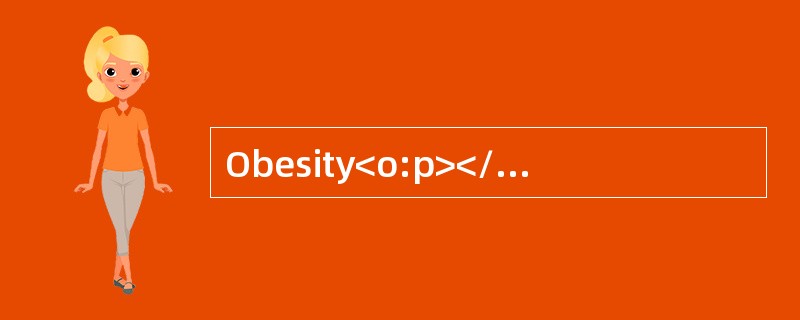Obesity
Obesity refers tothe medical condition characterized by storage of excess body fat. The humanbody naturally stores fat tissue under the skin and around organs andjoints.Fat
is critical for goodhealth because it is a source of energy when the body lacks the energynecessary to sustain life processes,and it provides insulation and protectionfor
internal organs.Buttoo much fat in the body is associated with a variety of health problems.
Most physicians usethe body mass index(BMI)to determine desirable weights.BMI is calculated asweight divided by height and people with a BMI of 27 or above are
considered obese.
Weight-heighttables,such as those published by the Metropolitan Life Insurance Company,arealso used as general measures of desirable weight ranges.These tables assign a
range of weights fora particular height.For example,a man of 8m has a desirable range of 66 to 83kg,with an average of 75 kg. A woman who is 6 m has a desirable
range between 53 and70 kg,with an average of 62 kg.
The BMI andweight-height tables only provide rough estimates of desirable weights andscientists recognize that many other factors besides height affect weight.Weight
alone may not be anindicator of fat,as in the case of a body-builder who may have a high BMIbecause of a high percentage of muscle tissue,which weighs more than fat.
Likewise,a personwith a sedentary lifestyle may be within a desirable weight range but haveexcess fat tissue.
Obesity increasesthe risk of developing disease.According to some estimates,almost 70 percent ofheart disease cases are linked to excess body fat,and obese people are more
than twice as likelyto develop high blood pressure.Obese women are at nearly twice the risk fordeveloping breast cancer,and all obese people have an estimated 42 percent
higher chance ofdeveloping colon cancer. The risk of medical complications particularly heartdisease increases when body fat is distributed around the waist,especially in
the abdomen.Thistype of upper body fat distribution is more common in men than in women.
The social andpsychological problems experienced by obese people are also formidable.Stereotypesabout"fat"people are often translated into discriminatory practicesin
education,employment,and social relationships.The consequences of being obese in a world wherepeople had better be "thin"are especially severe for women,whose
appearances areoften judged against and ideal of exaggerated slimness.
A.looked down uponby others
B.welcomed by others
C.consideredseverely ill
D.thought of havingspecial problems
参考答案与解析:
-
相关试题
